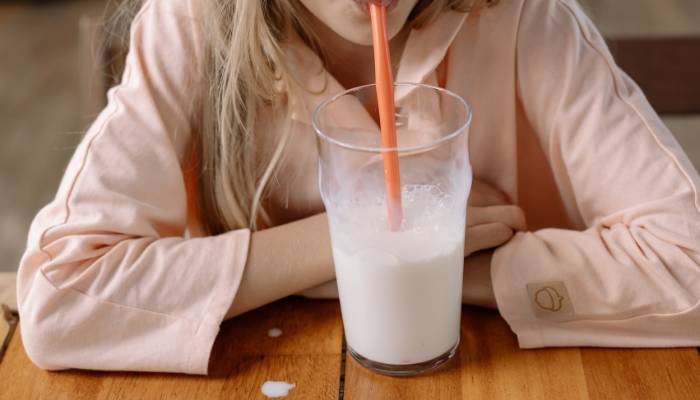
Milk is a commonly craved food that can be enjoyed in many ways, whether it’s poured over cereal, used to make smoothies or enjoyed on its own. However, people may wonder why they crave milk and if there are any underlying reasons behind their desire for this nutrient-rich beverage. While some people may crave milk purely for its taste, there can be many biological, psychological, and medical reasons that contribute to milk cravings. Understanding the various reasons behind milk cravings can help people determine the best course of action to manage them effectively. In this blog post, we will explore the different reasons why people crave milk, and provide practical tips for managing those cravings.

Biological Reasons for Milk Cravings
There are several biological reasons why people might crave milk. Here are some of the most common ones:
- Nutritional Content: Milk is a rich source of nutrients such as calcium, protein, and vitamin D, which are essential for maintaining bone health and overall well-being. Thus, milk cravings may be a sign of nutrient deficiencies that the body is trying to correct.
- Hormonal Triggers: Milk contains the hormone cholecystokinin, which helps to promote feelings of fullness and reduce appetite. Thus, consuming milk can help to regulate hunger and cravings.
- Dopamine Release: Drinking milk can trigger the release of dopamine, a neurotransmitter associated with feelings of pleasure and reward. This may explain why some people crave milk for its taste and texture.
- Lactose Cravings: Lactose is a sugar found in milk that some people may crave. Lactose cravings may be related to the release of dopamine in the brain, similar to the effect of consuming other sweet foods.
Understanding these reasons can help people make informed decisions about their milk intake and develop healthy habits.
Psychological Reasons for Milk Cravings
In addition to biological reasons, there are also psychological reasons why people might crave milk. Here are some of the most common ones:
- Taste Preferences: Milk is a popular beverage that many people enjoy for its creamy texture and slightly sweet taste. Thus, some people may crave milk simply because they like the way it tastes.
- Childhood Associations: For many people, milk is associated with positive childhood memories, such as enjoying a glass of milk with cookies after school or having warm milk before bed. These positive associations may contribute to milk cravings later in life.
- Comfort Food: Milk can be a comforting beverage for some people, similar to other comfort foods like mac and cheese or chicken noodle soup. Drinking milk may provide a sense of emotional comfort or security, especially during stressful or uncertain times.
- Oral Fixation: Some people may crave milk as a way to satisfy an oral fixation or need to chew or suck on something. Drinking milk can provide a similar sensation to sucking on a pacifier or chewing gum, which may be soothing for some people.
Being aware of these factors can help people identify the root cause of their milk cravings and develop alternative coping strategies to manage them.
Medical Conditions Associated with Milk Cravings
Certain medical conditions can also increase milk cravings. Here are some examples:
- Pregnancy: Many pregnant women experience intense cravings for milk and other dairy products, which may be related to hormonal changes and the body’s need for calcium and other nutrients.
- Menopause: Menopausal women may experience milk cravings due to fluctuations in hormones, especially estrogen.
- Lactose Intolerance: People with lactose intolerance may experience milk cravings because they are unable to digest lactose properly. The body may crave milk as a way to obtain nutrients like calcium that are difficult to get from other sources.
- Medications: Some medications, such as antidepressants or antipsychotics, can increase milk cravings as a side effect.
If you have a medical condition that is causing milk cravings, it’s important to speak with your healthcare provider to determine the best course of action to manage your symptoms.
Tips for Managing Milk Cravings
If you find yourself craving milk and want to manage your intake, here are some tips to consider:
- Incorporate other calcium-rich foods: If you’re craving milk because of its calcium content, try incorporating other calcium-rich foods into your diet, such as leafy greens, tofu, almonds, or fortified plant-based milks.
- Explore non-dairy alternatives: If you’re lactose intolerant, vegan, or simply looking to reduce your dairy intake, try exploring non-dairy milk alternatives, such as almond milk, soy milk, or oat milk.
- Practice mindful eating: Before reaching for a glass of milk, take a moment to check in with yourself and determine if you’re really hungry or just thirsty. Drinking a glass of water or having a healthy snack may help curb your cravings.
- Address underlying causes: If your milk cravings are related to medical conditions or psychological factors, it’s important to address these underlying causes to manage your cravings effectively. Consider speaking with your healthcare provider or a mental health professional to explore options for treatment or management.
- Enjoy in moderation: If you simply enjoy the taste of milk, there’s no need to completely eliminate it from your diet. Instead, practice moderation and enjoy milk in small amounts or as part of a balanced diet.
By taking a proactive approach to managing your milk cravings, you can maintain a healthy relationship with this nutrient-rich beverage.
Conclusion
In conclusion, milk cravings can be caused by a variety of biological, psychological, and medical factors. Understanding the reasons behind your cravings can help you manage them more effectively and make informed decisions about your milk intake.

Welcome to MithilaConnect, where we curate the art of living, celebrating the vibrant tapestry of life through culture, fashion, food, and everything in between.
